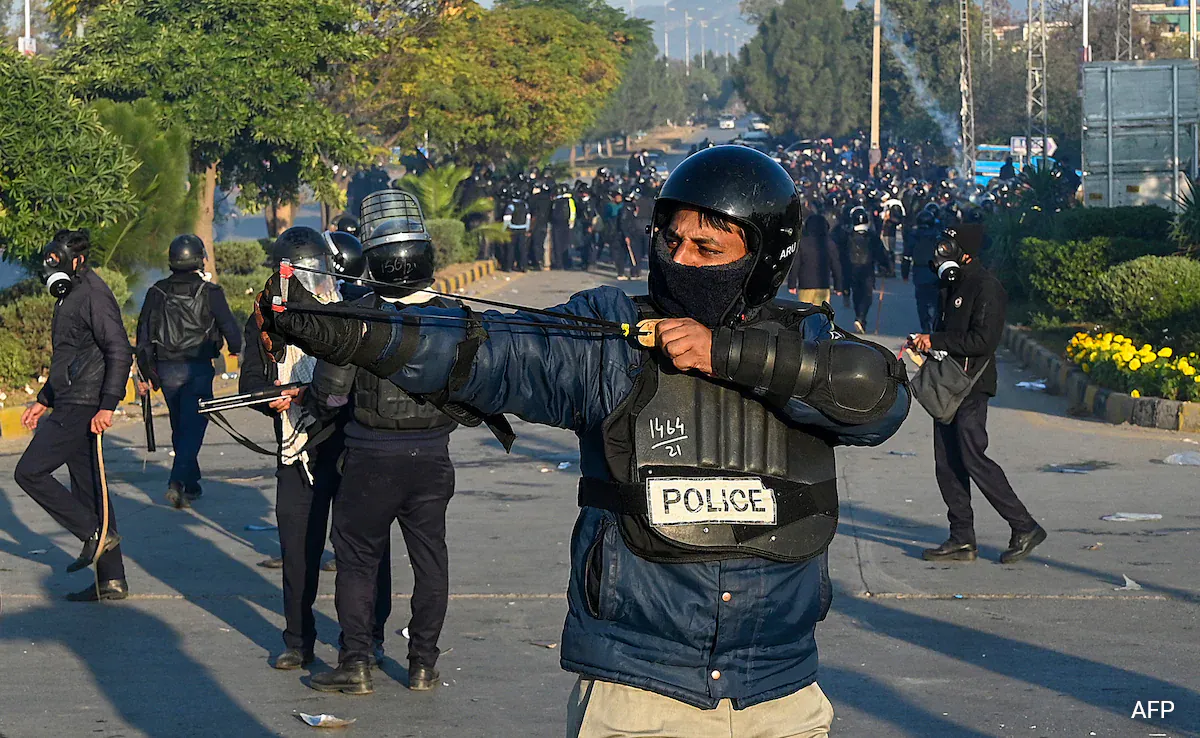As tensions continue to rise in Pakistan, supporters of former Prime Minister Imran Khan clashed with security forces outside Islamabad on Monday. At least one police officer was killed, and dozens injured, as authorities enforced a heavy security lockdown and shut down major roads in the capital to prevent further escalation.
Protests Turn Deadly Near Islamabad
Protests demanding the release of the former Prime Minister, who has been languishing in prison, descended into clashes on Wednesday with security forces just outside Pakistan’s capital. Punjab provincial police chief Usman Anwar confirmed that one of the policemen was shot dead and that at least 119 people were injured, among them two officers in critical condition. Protesters also set fire to 22 police vehicles, according to reports.
Khan’s party, Pakistan Tehreek-e-Insaf (PTI), stated that thousands of its supporters received injuries during clashes. In the march at the head of protesters was Khan’s third wife, Bushra Bibi, and Chief Minister of Khyber Pakhtunkhwa Ali Amin Gandapur, who still managed to bring the march almost to the entrance of Islamabad late on Monday.
Government Response and Security Measures
In anticipation of the protest, the government had taken extensive security measures. Major roads and streets of Islamabad were blocked by shipping containers, and public transport was suspended in the eastern province to limit the movement of demonstrators. Police and paramilitary forces in riot gear patrolled the streets to keep the demonstrators from reaching the center of Islamabad.
Provincial Information Minister Uzma Bukhari confirmed that approximately 80 of Khan’s supporters were taken into custody during the protest. Defence Minister Khawaja Muhammad Asif moved to try to temper tensions by stating that the government had initiated talks with PTI leaders, though it was reported that no concrete results had been achieved so far.
Assertions of Excessive Use of Force and Escalating Hostilities
Interior Minister Mohsin Naqvi said security forces showed “extreme restraint” in the face of violence, despite allegations that at least some protesters had opened fire on the police with live rounds. Naqvi added that security forces tried to contain the situation with rubber bullets and tear gas and did not use lethal force. Meanwhile, the government had offered the PTI permission to hold a protest in an open field on the outskirts of Islamabad and was still waiting for their response.
Naqvi warned that if the protesters continued marching towards parliament, the government may impose more serious measures, even curfews or military troops, and “we will not let them cross our red lines,” he added.
Meanwhile, PTI leaders accused the government of using excessive violence to stop their protest. Senior party official Shaukat Yousafzai accused police of firing live rounds at crowds and said many supporters were detained unjustly.
Heightened Security for International Visits
The situation was compounded by the increased security deployed in Islamabad as Belarusian President Aleksandr Lukashenko arrived for a three-day official visit. The government banned public gatherings in the capital and declared schools in Islamabad and Rawalpindi would be closed for two days.
It Was a Long Struggle of Imran Khan’s Release, Monday is what Imran Khan has billed as his “final call” for action, part of a string of protests PTI has held since Khan was arrested in August 2023. The last time he tried to mobilize his followers in early October saw violent clashes engulf the capital. Khan, who was removed from power in 2022 after losing the support of Pakistan’s powerful military, faces various charges of corruption and inciting violence accusations he and his party emphatically reject.
With the protests growing in intensity, the situation remains volatile, with neither side indicating any retreat shortly. The political crisis has deepened the fissures within the country, and its consequences have now brought fears of future Pakistan stability amidst this unrest.















